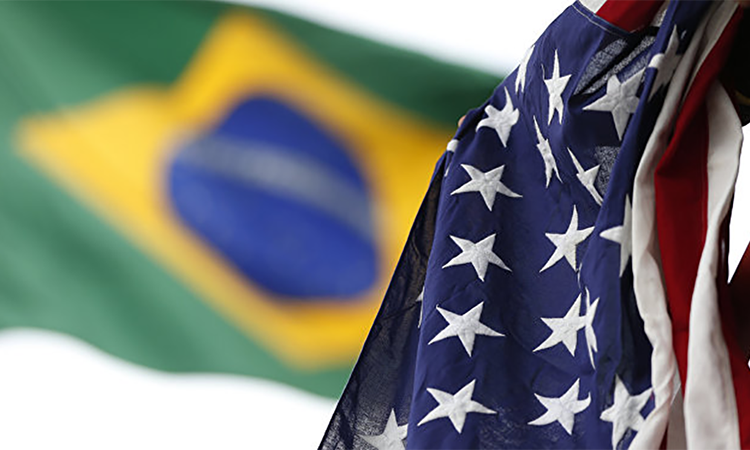General Context, Recommendations, and Prospects for US-Brazil Relations in a Changing World

Source: U.S. Embassy & Consulates in Brazil
By Rafael Ioris* [Republicação] [Brasil-EUA]
The recent return of Donald Trump to the presidency of the United States was received with concern in many parts of the world given his isolationist and confrontationist approaches to foreign policy. In Brazil, after a contentious election in October 2022, Lula defeated the authoritarian option led by Bolsonaro, confirming that most Brazilians were ready to rebuild their democratic institutions, under constant attacks in the previous four plus years. It was when Trump and Bolsonaro established close personal relations, but though the latter sought to strengthen bilateral ties, Brazil did not assume a central place in US foreign policy.
Trying to reshape things, Lula’s new presidential term started with a visit to the White House when he and former president Joe Biden professed their defense of democratic values and committed their support to democratic institutions in their respective nations. Soon after, Lula went to China with a large delegation. In so doing, Lula, once again, sought to consolidate a universalist line foreign policy wherein traditional relations are sustained while new projects and partners are added. This approach, which served the Brazilian leader well in his first two terms, faces new challenges in a world increasingly defined by global hegemonic disputes and the return of wars to the forefront of inter-state relations.
2025 marks the bicentennial of US-Brazil diplomatic relations, and Trump and Lula will have to interact. Besides being the two largest democracies in the continent, they are also the leaders of the two largest economies in the Western Hemisphere. And even though they hold very different stances on geopolitics and much else, pragmatism could push both to find ways to make the bilateral relationship at least functional, though likely with significant tensions and limitations.
Still, even if considering the clear contrasting ideological positions of their leaders and the growing disparate goals both countries assume in the world today notwithstanding, Lula manifested a desire to sustain a course of good relations with the United States, one of Brazil’s most traditional allies and the country’s second-largest trading partner, so long mutual respect is present. Undoubtedly, the expansion of the BRICS and China’s growing influence in Latin America create a challenge the traditional landscape wherein bilateral relations used to unfold.
This increasingly complex scenario demands increased mobilization from state and civil society actors. There is much to be done, and this Policy Paper seeks to contribute towards constructive mutual engagement.
Trade and Economic Relations
Despite no longer being Brazil’s main economic partner, the US continues to exert an important role in Brazil’s economy (and vice-versa), as US exports to Brazil reached $40 billion in 2024. Things could worsen were Trump to follow through on his recent threat to impose tariffs on Brazil’s exports to the US, particularly steel and ethanol.
These actions lead to rising prices domestically in the United States, but it is yet unclear whether this shall be enough to reverse the course of actions the new administration is pursuing. This not being the case, perhaps the growing Chinese economic presence in Brazil could lead towards more positive incentives from the US to reverse course. In effect, Brazil and China have recently signed dozens of economic and development agreements, including on building new routes to cross South America to send Brazilian goods directly to China through the Pacific Ocean.
These trends will clearly pose new challenges, but perhaps also reasons for constructive dialogue on possible new economic partnership between the US and Brazil. Similarly, the Trump administration has expressed concern about the recent expansion of the BRICS bloc and given Brazil’s central role in it and the long history of close economic ties Brazil has had with the United States, Lula will play an important role in continuing to defend the notion that the BRICS does not seek to displace the presence of the US in global economic affairs.
Though the growing role of China within the BRICS, Lula’s position faces new challenges, but it is still possible to sustain the case that the BRICS does not need to be seen as an anti-Western bloc and that its pursuit of strengthening internal trade with local currencies is a move that does not seek to replace the US dollar as a de facto global currency. Brazil should make this case more overtly to US authorities, particularly before the Trump administration may seek to impose a new 100% tariff on exports from BRICS countries to the US.
In addition to China, the recently signed Mercosur-European Union agreement might also provide new business opportunities for Brazil. Though the agreement still needs to be signed by EU member countries, something that is not entirely assured, particularly in France, this news development should be of interest to new Trump administration in terms of its influence in Brazil. In effect, given that Brazil and the US compete in various export items, such as in agribusiness, ethanol and steel, both countries would benefit from exploring news areas of convergence, particularly in green energy.
Environment, Energy and Sustainable Development
Brazil is global leader on environment-related issues, and much is expected on this area from Lula since his return. This coming November, Brazil will host the United Nations Climate Change Conference (UN COP30). In preparation for this important gathering, Lula stated that he expects the international community to live up to commitments they will make, a position that diverges from the Trump administration’s recent actions to reverse US and international efforts on environmental issues. Brazil recent debates about exploiting oil and gas reserves in the Amazon do not bode well for its image in the upcoming COP.
This contradiction however could provide an opportunity for bilateral relations by portraying Brazil’s openness to a slower transition from fossil fuels and perhaps be conducive to a path for energy transition talks with US authorities. Green energy does not need to be seen as a threat to established businesses as it may indeed lead to new economic opportunities, especially for US companies operating, such as automakers already offering battery-run models.
Brazil and the US are not aligned on their views on regulatory frames and actors, currently under attack in the latter while being rebuilt in the former after four years being dismantled under Bolsonaro. This divergence could perhaps be minimized, and this is where additional private and not-for-profit actors could play a role in incentivizing broader openness from the US to perhaps change its course of action. After all, as green energy is growing in Brazil, including by means of large Chinese energy and auto-making firms, there should be growing interest in the US to be part of these trends, as well.
By themselves, market forces won’t suffice to address the growing challenges of the climate. Indigenous and local communities must therefore be included in future conversations and actions regarding economic activities, particularly mining, especially in the Amazon. Broader levels of cooperation between indigenous activists in Brazil and the United States (and beyond) must be encouraged and supported.
Immigration and Border Issues
The United States-Mexico border and especially the many migrants that cross it every year are at the core of the US foreign policy towards Latin America. Though Brazil is not a central country in these matters, there are growing numbers of Brazilians that arrive in the US, often without proper paper, through the US southern border (and beyond). This is why recent actions from the Trump administration to arrest and deport Latin America has also become a thorny issue in US-Brazil relations.
In effect, though Trump has recently declared that new tariffs would hit central exports from Brazil, the main diplomatic tension in Trump’s first weeks in office has been the deportation of handcuffed Brazilian citizens in US planes. This led to the creation of a working group to exchange information and improve the operationalization of return flights for undocumented Brazilians in the US, ensuring the safety and respectful treatment of passengers.
But given that US actions are related to the goal of controlling drug trafficking and that this complex issue does also impact Brazil, better responses would derive from a regional approach that would include multiple actors, state and non-state across the hemisphere. Dialogue could be promoted in the spheres of the Organization of American States (OAS) as well as the Community of Latin American and Caribbean States (CELAC), based on the defense of human rights treaties and seeking to promote local actions to prevent the influx of new migrants.
Digital Challenges to Democracy
During part of Trump’s first administration, Jair Bolsonaro was the president of Brazil, and both leaders acted to advance similar anti-democratic political agendas including by spreading rampant misinformation in new digital media platforms. Regulating these media has been a focus of Brazilian authorities, thus positioning Brazil as global reference for countries seeking to address the challenges of fake news and defend the value of democracy. But despite continued public attacks, and a legal case Florida, against Brazil’s Supreme Federal Tribunal Justice Alexandre de Moraes’ actions to regulate digital platforms operating in Brazil, bilateral diplomatic engagement should include this thorny but unavoidable topic.
Global discussions on these matters are taking place, such as recently in Paris, and there is growing recognition that international collaboration is needed. Both nations will therefore benefit from a frank conversation that includes media and civic organizations. There are clear limits on how far each side will be willing to go towards common ground, but only by constructive engagement things could deescalate.
Global Governance
In today’s growing hegemonic disputes between the United States and China, developing nations face new challenges if they want to sustain good relations with both sides of the competition. This is certainly the case of Brazil, one of the largest democracies in the Global South and country still working to rebuild its own democratic institutions. Beyond that, Brazil is also seen as refence nation for similar problem faced across the developing world. In fact, depending on how these challenges are addressed, or at least faced by Brazilian leaders, they could open opportunities or add problems to similar countries, in Latin America and beyond.
Though the United States used to be the main trading partner and investor of most countries across the globe, today China is the main trading partner of more than 120 economies and the most dynamic center of the global economy. Navigating through the geopolitical interests of China and the US won’t be easy for anyone. Moreover, multilateral institutions face today some of their most acute challenges since World War II and regional economic and geopolitical blocs seem to be in the making.
This is where Brazil’s established universalist approach in diplomacy will be central. Though far from perfect, multilateralism has served to enlarge the international agenda to include matters vital to developing countries. And since the end of the Cold War, and its own process of transitioning to an emerging democracy, Brazil has assumed a leading role in expressing the needs and aspirations of poor and developing nations across the globe. Recently these actions assumed prominence, first at the G20, having hosted the blocks annual conference in November 2024, and currently holding the leadership of the BRICS.
Considering that the Trump administration does not seem to value global institutions as much as its predecessors, Brazil’s role in them could growth so long it manages to maneuver a middle ground position amidst rising economic and geopolitical blocs. Dialogue with the US authorities should continue though, particularly aimed at making the case that the US growing isolationism might be seen domestically as responding to the country’s current needs, but it does not indeed response to its losing competitive edge vis-vis rising competitors. As in the previous areas mentioned above, these conversations should include representatives from private actors and civil society.
Prospects, Need, and Potential for Deepening Bilateral Relations
Trump’s return to the White House promises a more isolationist and confrontationist foreign policy. US-Latin Relations seem to be returning to a place in the past, that of guaranteeing, as the assured region under control, by force, if necessary, the United States growing global ambitions. Given its size, in terms of economy, territory, and populations, and rising regional and global diplomatic weight, Brazil will be at the center of US potential actions in the region.
In effect, though Latin America is more fragmented today than a decade ago, Brazil still may be able to promote regional cooperation, particularly in the many areas listed above, particularly should its leaders be able to coordinate efforts along with other important countries of the continent. Cooperative actions may be further strengthened if civil society actors are included in key initiatives, especially regarding human rights, environment, and the defense of democratic values and institutions.
And even if some of these may not seem conducive to constructive US-Brazil collaboration, one needs to go beyond the rhetoric and seek for key points of convergence. For one, Lula and now Trump signal support for a cease-fire in the war in Ukraine. And though this is not a core element of their relationship, it might be an opening in conversations. Similarly, though Brazil is not ready to give its closer economic ties with China, this very reality may inspire US leaders to be more creative in their dealings, otherwise risking further deepening of Brazil-China engagement. What’s more, perhaps as what happened during the Bush administration in the early 2000s, regional problems, such as in Venezuela, might serve as an incentive to see Brazil as a more stable country, and even as a functional partner in dealing with Latin America’s persistent problems.
As disruptive as President Trump has behaved since his ascension to the US presidency, US-Brazil relations have a long history of dialogue and multiple forms of collaboration. There are growing challenges in the horizon. But instead of seeing them as reasons to disengage, they should be seen as reasons to expand existing lines of dialogue beyond the formal diplomatic channels to include academics, members of the media, private economic actors and from the broader civil society. In so doing, the two largest countries and democracies of the Western hemisphere shall harness and mutually benefit from the great potential (and need) for collaboration they possess. ![]()
 * Rafael R. Ioris is a Professor at the University of Denver, USA, and a researcher at INCT-INEU. Contato: rafael.ioris@du.edu.
* Rafael R. Ioris is a Professor at the University of Denver, USA, and a researcher at INCT-INEU. Contato: rafael.ioris@du.edu.
** This article was originally published in the 2025 Policy Paper “U.S.-Brazil Relations: Key Areas and Challenges under the Trump Administration”, by Washington Brazil Office. This content does not necessarily reflect the opinion of OPEU, or INCT-INEU.
*** About OPEU, or to contribute articles, contact editor Tatiana Teixeira. E-mail: tatianat19@hotmail.com. About our Newsletters, for press service, or other matters, contact Tatiana Carlotti. E-mail: tcarlotti@gmail.com.
Subscribe to our Newsletter and receive OPEU content by email.
Follow OPEU on Instagram, Twitter, Linkedin and Facebook and follow our daily posts.
Comment, share, send suggestions, be part of our community.
We are a unique Brazilian research observatory on the United States,
with weekly, free, non-profit content.





















